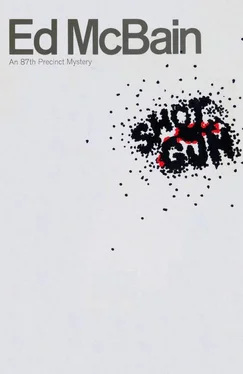“To tell you I love you.”
“Ha!”
“I love you,” Kling said.
“Yeah.”
“I do.”
“Yeah.”
“I love you.”
“Then why—”
“We were going out for a cup of coffee, that’s all.”
“Sure.”
“There’s nobody in the whole world I want but you,” Kling said.
Cindy did not answer.
“I mean it.”
She was still silent.
“I love you, honey,” he said. “Now come on.” He waited. She was standing with her head bent, watching the floor. He did not dare approach her. “Come on,” he said.
“I wanted to kill you,” Cindy said softly. “When I saw you together, I wanted to kill you.” She began weeping gently, still staring at the floor, not raising her eyes to his. He went to her at last and took her in his arms, and held her head cradled against his shoulder, his fingers lightly stroking her hair, her tears wetting his jacket and his shirt.
“I love you so much,” she said, “that I wanted to kill you.”
On Sunday afternoon, Mr. and Mrs. George Pimm returned from their vacation in Puerto Rico and were promptly visited by the police.
They were in the midst of unpacking when Carella and Kling arrived. It was difficult to keep them to the point. This had been their first trip to the Caribbean, and they were naturally anxious to tell someone — anyone — all about it. Unfortunately, the detectives were the first people they’d seen since their return.
“A wonderful island,” Pimm said. “Have you ever been there?”
“No,” Carella said.
“No,” Kling said.
“Well, what’s your sight-unseen impression of it, would you tell me that?” Pimm said. He was a slender man with bright blue eyes and sandy-colored hair. He had acquired a deep tan on the island, and he unpacked now with all the sureness and vigor of a person who feels and looks healthy. His wife, Jeanine, was a petite brunette who kept carrying things to the dresser and the closet and the bathroom as Pimm took them from the suitcases. She was already beginning to peel, especially on the nose. She kept smiling as Pimm discussed the island. “If you judge from this city,” Pimm said, “you expect Puerto Ricans to be misfits, don’t you? Drug addicts, and street fighters and prostitutes, and what not, excuse me, honey,” he said to his wife.
“That’s all right, George,” Jeanine said, smiling.
“But believe me, they are the sweetest, gentlest people in the world,” Pimm said. “Well, look, we came out of El Convento, that’s a hotel down there in the heart of Old San Juan, we came out of there one night after the dinner and floor show — wonderful floor show, by the way — and oh, it must’ve been after midnight, wasn’t it after midnight, honey?”
“Oh, yes, easily after midnight,” Jeanine said.
“Now, can you imagine walking in the Puerto Rican section of this city after midnight? Along the Spanish stretch of Culver Avenue, say? After midnight? No reflection on the work you fellows do,” Pimm said, “but that’d be taking your life in your hands, am I right?”
“Well, all slum areas are pretty much alike,” Carella said. “I wouldn’t want to walk along Ainsley after midnight, either.”
“George is even afraid of walking downtown on Hall Avenue,” Jeanine said, and smiled.
“That’s not true,” Pimm said. “Hall Avenue is perfectly safe. Isn’t it perfectly safe?” he asked Carella.
“Well, there’ve been muggings in good neighborhoods too. But I guess Hall Avenue is fairly safe.”
“Anyway, that’s not my point,” Pimm said. “My point is, there we were in the heart of Old San Juan, walking the streets after midnight, Jeanine all dolled up, both of us surrounded by Puerto Ricans, the only tourists walking around down there so late at night, but were we afraid anything would happen? Absolutely not! We felt perfectly safe, we felt those people meant us no harm, were in fact glad to have us there and anxious to make us welcome. Now, why should that be?”
“Why should what be?”
“Why should they come to this city and start throwing garbage out the windows, and start living like pigs, and taking dope, and selling their sisters, and causing trouble everyplace? Why should that be?”
“Maybe they’re better hosts than we are,” Carella said.
“Huh?”
“Maybe if we made them feel safe, things would be a little different.”
“Well, anyway,” Pimm said dubiously, “it’s a beautiful island.”
“Tell them about El Junque,” Jeanine suggested.
“Oh, yeah, El Junque, that’s the rain forest. You go into this enormous forest—”
“A jungle, really,” Jeanine said.
“Right, a jungle,” Pimm said, “this is the forest primeval,” he quoted, “and—”
“Mr. Pimm,” Carella said, “I know you’re anxious to get on with your unpacking, and this is probably an inconvenient time—”
“No, no, not at all,” Pimm said, “we can unpack while we talk, can’t we, Jeanine?”
“Oh, sure, there isn’t much more to do, anyway.”
“Well, we don’t want to take up too much of your time,” Carella said. “We were wondering if you’d heard anything about the Leyden murders while you were south.”
“Yes, it was in the newspapers. Terrible thing,” Pimm said.
“Terrible,” Jeanine repeated.
“Did you know them well?”
“As well as you get to know anybody in an apartment house,” Pimm said. “You know the old cliché. People can live next door to each other for years without ever knowing each other’s names.”
“Yes, but you did know the Leydens?”
“Never been in there, if that’s what you mean,” Pimm said.
“Well, George, we’ve only lived in the building a year.”
“Little more than a year,” Pimm said.
“And you’ve never been inside the Leyden apartment?”
“No, never.”
“Well, I was in there once,” Jeanine said.
“When was that?”
“She was sick one morning. I met her downstairs doing the laundry. In the basement. She looked awfully pale, I thought she might faint or something. So I came upstairs with her into the apartment. She got sick in the bathroom.”
“When was this, Mrs. Pimm?”
“In April, I think it was. Yes, it was a little after the beginning of April.”
“When you say she got ‘sick’ in the bathroom, do you mean—?”
“Yes, she threw up.”
“She was pregnant, wasn’t she?” Pimm asked. “Isn’t that what Mrs. Leibowitz said?”
“Yes, later on we found out she was pregnant. Mrs. Leibowitz told us she lost the baby. That’s our next-door neighbor.”
“Yes, we’ve met her,” Kling said.
“A nice lady,” Pimm said.
“She’s deaf,” Jeanine said.
“Well, a little hard of hearing,” Pimm said.
“But aside from that one time in the apartment—”
“That’s right,” Jeanine said.
“... you were never in there, never really friendly?”
“That’s right.”
“Nor did she visit you.”
“Well, they kept to themselves, you know. He was on the road a lot, he’s a traveling salesman, you know... ”
“Yes.”
“... sells heavy machinery, I think.”
“Tractors,” Jeanine said.
“That’s right.”
“Yes.”
“So he was hardly ever around, you know, gone for months at a time.”
“I’d see her down in the basement every now and then,” Jeanine said. “Or in the elevator. You know. Like that.”
“She was a nice girl,” Pimm said. “Seemed to be, anyway.”
“Yes,” Jeanine said.
Читать дальше












